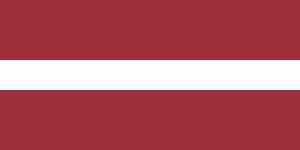Language/Standard-latvian/Grammar/Adjectives-and-their-agreement-with-nouns
Introduction[edit | edit source]
In Latvian, adjectives are used to describe or modify nouns. They provide additional information about the characteristics or qualities of the noun they modify. One of the key features of Latvian adjectives is that they must agree with the nouns they modify in terms of gender, number, and case. In this lesson, we will explore the formation and usage of adjectives in Standard Latvian, as well as the rules for their agreement with nouns.
Formation of Adjectives[edit | edit source]
Adjectives in Latvian typically have a characteristic ending that depends on their gender and number. The most common endings for adjectives in the nominative case are:
- Masculine singular: -s (e.g., liels - big)
- Feminine singular: -a (e.g., liela - big)
- Masculine plural: -i (e.g., lieli - big)
- Feminine plural: -as (e.g., lielas - big)
Adjectives can also be declined in other cases, and their endings will change accordingly.
Agreement of Adjectives with Nouns[edit | edit source]
In Latvian, adjectives must agree with the nouns they modify in gender, number, and case. This means that the ending of the adjective must match the ending of the noun in terms of these grammatical features. Here are some examples of adjective-noun agreement:
- Liels suns (big dog) - masculine singular, nominative
- Liela māja (big house) - feminine singular, nominative
- Lieli zēni (big boys) - masculine plural, nominative
- Lielas meitenes (big girls) - feminine plural, nominative
When an adjective modifies a noun in a different case, both the adjective and the noun must be declined to match that case:
- Ar lielu suni (with a big dog) - masculine singular, instrumental
- Bez lielām mājām (without big houses) - feminine plural, instrumental
Usage of Adjectives[edit | edit source]
Adjectives are used to provide descriptive information about nouns. They can be used attributively (directly before the noun) or predicatively (after a linking verb, such as "to be"). Here are some examples:
- Attributive: Viņam ir liels dārzs. (He has a big garden.)
- Predicative: Dārzs ir liels. (The garden is big.)
Conclusion[edit | edit source]
Adjectives are an important part of Latvian grammar, as they provide descriptive information about nouns. The key feature of Latvian adjectives is their agreement with nouns in gender, number, and case. By understanding the formation and usage of adjectives, as well as the rules for their agreement with nouns, learners can enhance their ability to express detailed and descriptive information in Latvian.
Other lessons[edit | edit source]
- The subjunctive mood and wishes
- The past tense and other verb forms
- The accusative case and direct objects
- The verb "to be" and basic sentence structure
- How to Use Have
- Nouns
- Gender
- Pronouns
- Give your Opinion
- Negation
- The verb to be and basic sentence structure
- Prepositions and their cases
- Future Tense
- The conditional mood and hypothetical situations
- The genitive case and possession

